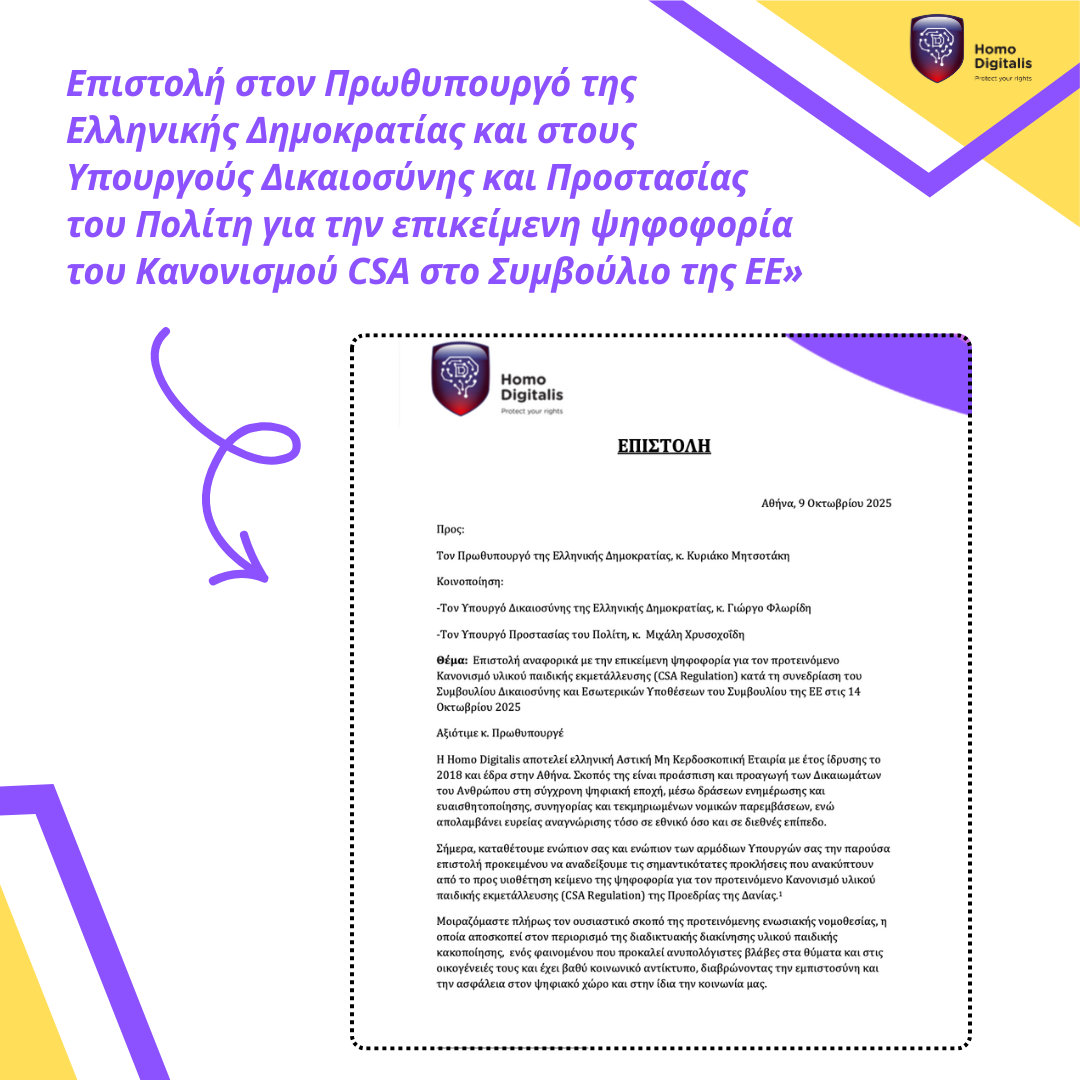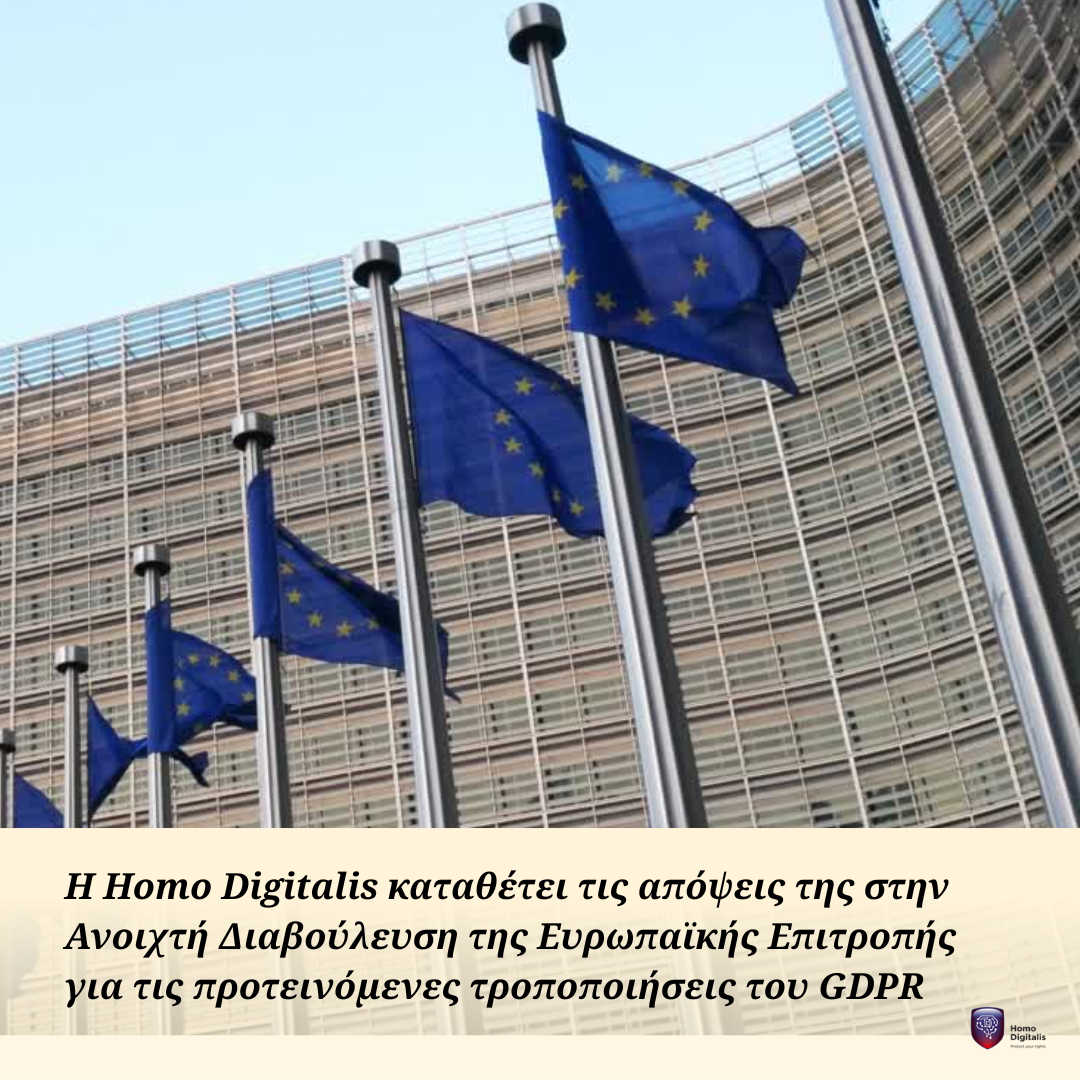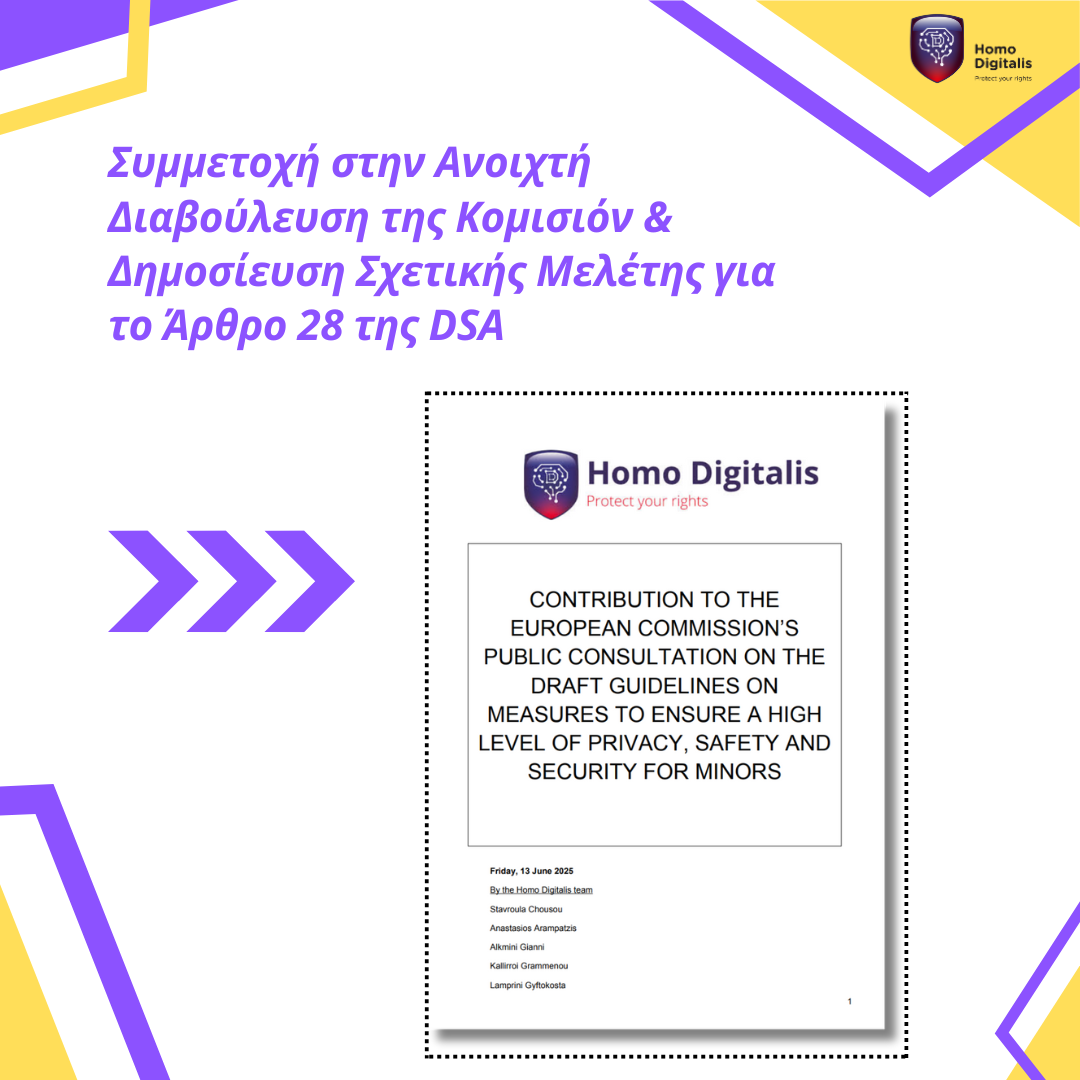We submit an Open Letter to the Prime Minister, calling on the Hellenic Republic to reject the Danish Presidency’s text on the CSA.
Homo Digitalis today submitted an Open Letter to the Prime Minister of the Hellenic Republic, Kyriakos Mitsotakis, regarding the proposed Regulation on Child Sexual Abuse Material (CSA Regulation).
In our letter — which we have also shared with the Minister of Justice and the Minister for Citizen Protection — we call on the Hellenic Republic to reject the Danish Presidency’s text in the upcoming vote at the EU Justice and Home Affairs Council on October 14, 2025.
The objective of the Regulation — to curb the distribution of child sexual abuse material — is right and necessary. However, the text proposed by the Danish Presidency would achieve the opposite effect, undermining security and trust in the digital space.
Specifically, 787 leading experts in communication security and encryption — including professors from top academic institutions in Greece — have emphasized that:
The technology for detecting child sexual abuse material is inaccurate and ineffective.
Mandatory scanning undermines end-to-end encryption and opens the door to mass surveillance.
The proposed technical measures can be easily bypassed by malicious users and threaten anonymity and freedom of information.
Real child protection comes through education and support for victims, not through mass monitoring.
On October 14, Greece’s position must be guided by knowledge, technical expertise, and the fundamental principles and values upheld by the EU Charter of Fundamental Rights and the Constitution of Greece.
You can read the full text of our open letter here.
You can also read a related article recently published on our website by our member Stergios Konstantinou here.
Learn more about Homo Digitalis’s work on this issue, including past meetings between our members — Haris Kyritsis, Haris Daftsios, Niki Georgakopoulou, Giorgos Sarris, and Angelina Barla — and Greek Members of the European Parliament, in cooperation with European Digital Rights (EDRi), here.
Homo Digitalis Participates in the European Commission’s Meeting on the Protection of Minors Online under the DSA Framework
The Directorate-General for Communications Networks, Content and Technology (DG CONNECT) of the European Commission visited the offices of the Representation of the European Commission in Athens, holding a series of discussions within the framework of the Digital Services Act (DSA) with various stakeholders and interested parties.
On Tuesday, September 30, a meeting was held on the topic of “Protection of Minors,” aiming to exchange views while taking into account the Commission’s recent Guidelines on Article 28 of the DSA and the need to strengthen the protection of minors online.
Homo Digitalis had the honor to participate in the discussion alongside representatives from independent authorities (EETT, Hellenic Data Protection Authority, National Council for Radio and Television), as well as representatives from the Ministry of Digital Governance, the academic community, and other organizations.
We warmly thank Ilektra Makraki, representative of the European Commission Representation in Greece for the DSA, for the invitation and inclusion. Homo Digitalis was represented at the meeting by its Co-founder and Executive Director, Eleftherios Chelioudakis.
We submitted our views to the European Commission’s public consultation on the assessment of the impact of the Digital Markets Act (DMA)
On September 23, Homo Digitalis submitted its views to the European Commission’s Public Consultation as part of the report it is preparing on the assessment of the impact of Regulation (EU) 2022/1925 on Digital Markets (Digital Markets Act – DMA).
The real impact of the DMA depends on the Commission’s determination to enforce it, honoring both the letter and the spirit of the regulation — namely, to create open and competitive digital markets, strengthen competition, and protect users’ rights.
You can read our full submission here.
For more information about the public consultation, click here.
We submitted our views to the European Commission’s public consultation on Article 30(5) GDPR
Yesterday, Homo Digitalis submitted its views as part of the European Commission’s public consultation on Article 30(5) of the GDPR.
In our submission, we call on the Commission to withdraw the proposed amendment and stress the need to ensure that the GDPR is not reopened or modified through broader deregulatory initiatives. The priority must remain on the effective application and enforcement of the existing framework, rather than on reducing the safeguards that are essential for protecting fundamental rights in the digital age.
You can read our full position here.
Homo Digitalis spoke on smart farming and the AI Act
In the beginning of july, the AgriDataValue project hosted an in-depth online workshop dedicated to data privacy, legal, and ethical dimensions within the context of smart farming. Organized by Netcompany, the event brought together AgriDataValue partners, Advisory Board members, legal experts, as well as representatives from related EU-funded projects.
Homo Digitalis participated in the workshop, giving a legal presentation on the topic “Smart Agriculture from a GDPR and AI Act Perspective”. Many thanks to Ioannis Chrysakis for the kind invitation! Our Executive Director, Eleftherios Chelioudakis, represented us.
The objective of the workshop was to identify and validate key ethical, legal, social, and privacy-related topics linked to the AgriDataValue platform. It also served as an opportunity to review data flow mappings between the project’s technologies, user types, and integrated services, a vital exercise for ensuring compliance, transparency, and responsible data governance.
We filed a complaint against Alphabet before the European Commission under the provisions of the DMA, together with five organizations.
European Digital Rights, ARTICLE 19, Free Software Foundation Europe (FSFE), Gesellschaft für Freiheitsrechte e.V., Vrijschrift.org, and Homo Digitalis filed a formal complaint against Alphabet Inc. under the Digital Markets Act (DMA) before the European Commission.
Despite the DMA’s clear gatekeeper rules:
On Android, users still cannot truly uninstall Google’s pre-installed apps; they can only disable them, which leaves them on the device. Yet Alphabet misleads users by claiming this is the same as removing an app. It is not.
The disable option is buried deep in the settings and, when users do find it, Android displays vague and intimidating warnings that discourage them from switching to alternative apps, making it harder to move away from Google’s ecosystem.
We are facing a textbook case of deceptive design, which restricts user choice and reinforces Alphabet’s gatekeeper position.
With our complaint, we call on the European Commission to investigate Alphabet’s practices and order the company to fully respect end-user rights under the DMA.
You can read our complaint on EDRi’s website here.
Homo Digitalis contributes to two EU consultations on the Data Strategy and high-risk AI systems
Last Friday, July 18th, Homo Digitalis submitted detailed input to two public consultations launched by the European Commission.
The first consultation focused on collecting targeted input from stakeholders regarding the implementation of the AI Act (2024/1689) rules for high-risk AI systems. According to Article 6(5) of the AI Act, the Commission must publish guidelines on the practical implementation of the high-risk classification rules by February 2, 2026, accompanied by a list of practical examples of both high-risk and non-high-risk AI systems. Additionally, Article 96(1)(a) requires the Commission to provide guidelines on the application of obligations and responsibilities for high-risk AI systems, including those across the AI value chain, as defined in Article 25. In its submission, Homo Digitalis provided practical examples of AI systems from Greece and other countries, and highlighted key issues that should be clarified in both the classification and compliance guidelines.
The second consultation addressed the EU Data Strategy. Its three goals are to: 1) boost investment in data technologies and promote data sharing through voluntary or funded initiatives; 2) streamline existing rules and develop data tools to reduce administrative burdens; and 3) shape an international data strategy that ensures safeguards for data transfers outside the EU and encourages data inflows into the EU.
In its response, Homo Digitalis raised strong concerns about potential undermining of personal data protection under the pretext of simplification, flexibility, and competitiveness. The organisation reaffirmed its position that fundamental rights must be strengthened through the use of new technologies and rejected the framing of existing legal frameworks as a barrier to innovation. According to Homo Digitalis, the challenges lie primarily in the lack of enforcement and resources, not the laws themselves.
You can read our full submission for the first consultation here.
We thank the drafting team, Stavrina Chousou, Niki Georgakopoulou, Sofia Antonopoulou, and Eleftherios Chelioudakis, for their valuable contributions.
You can read our full submission for the second consultation here, edited by our Executive Director, Eleftherios Chelioudakis.
We sent an open letter to the EU calling for a reassessment of Israel’s adequacy decision under the GDPR
Together with European Digital Rights, Access Now, and 16 other civil society organizations, we submitted a second open letter to the European Commission, urging it to urgently reassess Israel’s adequacy status under the GDPR.
Since the Commission reconfirmed Israel’s status in January 2024, the situation has only deteriorated:
Escalating human rights violations in Gaza and the West Bank
Expansion of surveillance systems and biometric repression
Legal reforms undermining oversight of personal data processing
Ongoing data flows to Israeli companies with ties to security services
Use of AI-driven targeting systems in a context where the International Court of Justice has found plausible genocide
Application of Israeli law to occupied territories, in breach of the EU’s own policy
This is not just about technical compliance. It is about whether the EU’s data protection framework can credibly uphold fundamental rights, and whether data originating in the EU is being used to facilitate unlawful practices.
Read the letter here.
We submitted our views to the European Commission’s public consultation on Article 28 of the DSA
On June 13, Homo Digitalis submitted its responses to the European Commission’s Public Consultation regarding the guidelines for the protection of minors online, within the framework of Article 28 of the Digital Services Act.
The responses to the questionnaire were accompanied by a study, which provided a more detailed explanation of the relevant proposals and concerns.
The editorial team for this action consisted of Stavrina Chousou, Anastasios Arampatzis, Alkmιnι Gianni, Kalliroi Grammenou, and Lamprini Gyftokosta.
You can read the responses to the questionnaire here.
You can read the study here.








